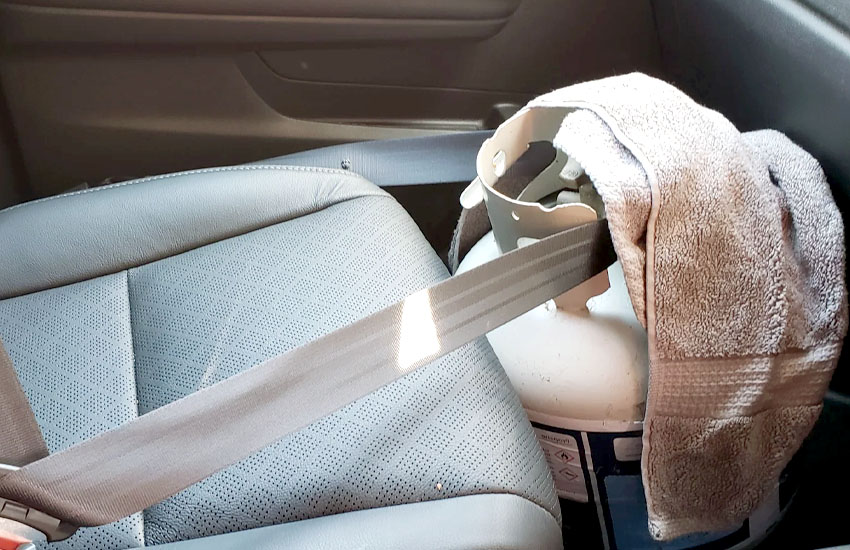You might be wondering if it’s safe to drive around with a propane tank in your car. It’s a good question! Propane tanks are often used for camping, grilling, or even in some RVs. But keeping one in your vehicle comes with certain risks. In this post, we’ll look at what you need to know to keep yourself and your passengers safe while carrying a propane tank. Let’s dive into the details!
Is It Safe to Drive Around with a Propane Tank in Your Car?
Driving with a propane tank in your car is a topic that many people wonder about. Propane tanks are commonly used for grilling and other outdoor activities, so it’s not unusual for people to transport them in their cars. But is it safe to do so? Let’s break it down.
First, it’s important to know that propane is a flammable gas. This means it can catch fire if it comes into contact with a spark or flame. However, if the propane tank is handled and stored correctly, the risks are manageable.
Here are some key points to consider:
Tank Condition: Before you put a propane tank in your car, make sure it is in good condition. Check for any dents, rust, or damage. A damaged tank is more likely to leak, which is dangerous. Always make sure the tank has been checked and is up to date with its inspection.
Proper Storage: When you transport a propane tank, it should be secured and kept upright. This helps prevent any potential leaks. If the tank is not properly secured, it might move around and cause issues. Some cars have special storage areas for propane tanks, but if yours doesn’t, you can use a secure container to keep it stable.
Ventilation: Make sure your car is well-ventilated when you are transporting a propane tank. Avoid keeping the tank in a sealed, hot, or enclosed space, as heat can increase the pressure inside the tank. This can potentially cause the tank to fail. A well-ventilated space helps keep the temperature stable and reduces the risk of pressure build-up.
Avoid High Temperatures: Do not leave a propane tank in a hot car. High temperatures can cause the pressure inside the tank to rise, which is risky. If possible, avoid transporting the tank during the hottest parts of the day, and never leave it in your car for extended periods.
Check for Leaks: Before you transport the tank, check for any leaks. You can do this by applying a soapy water solution to the connections and looking for bubbles. Bubbles indicate a leak, which is dangerous. If you find a leak, do not transport the tank and have it repaired or replaced.
Follow Local Laws: Different places have different rules about transporting propane tanks. Make sure you are familiar with and follow any local regulations. Some places might have specific requirements for how tanks should be transported.
Emergency Plan: Always have a plan in case something goes wrong. Know what to do if you smell gas or if there is an emergency. It’s also a good idea to have a fire extinguisher in your car, just in case.
In summary, driving with a propane tank in your car can be safe if you follow the right steps. Make sure the tank is in good condition, properly secured, and kept in a well-ventilated space.
Avoid exposing it to high temperatures and check for any leaks before you transport it. Lastly, be aware of local laws and have an emergency plan in place. By taking these precautions, you can help ensure that transporting a propane tank is as safe as possible.

Are These Questions in Your Mind?
Is it safe to store a propane tank in the trunk of my car?
Storing a propane tank in the trunk is generally not recommended. It’s better to keep the tank in the passenger area where it can be properly ventilated. If you must store it in the trunk, make sure it is secure and the trunk is well-ventilated.
Can I drive with an empty propane tank?
Yes, driving with an empty propane tank is generally safe. However, it’s still important to ensure the tank is securely stored and there are no leaks.
Do I need to turn off the propane tank valve before transporting it?
Yes, always turn off the valve on the propane tank before transporting it. This helps prevent any accidental leaks during transit.
Is it okay to transport a propane tank with other items in the car?
It’s best to avoid transporting a propane tank with other items that could potentially shift and damage it. Keep the tank separate and secure to prevent any accidents.
Can I transport a propane tank with the car windows closed?
It’s not advisable to transport a propane tank with the car windows closed. Proper ventilation is crucial to avoid pressure build-up and potential hazards.
Do I need to check the propane tank’s pressure before driving?
You don’t need to check the tank’s pressure before every trip, but you should be aware that high temperatures can increase pressure. Ensure the tank is in a cool, well-ventilated area.
Is it safe to transport a propane tank if it’s more than 10 years old?
If the propane tank is more than 10 years old, it should be inspected and recertified by a professional. An outdated tank might not be safe to transport.
Can I transport a propane tank in the back of a pickup truck?
Yes, you can transport a propane tank in the back of a pickup truck, but ensure it is securely fastened and covered to protect it from the elements.
Do I need to inform anyone before transporting a propane tank?
In most cases, you don’t need to inform anyone before transporting a propane tank, but it’s good practice to be aware of any local regulations and inform authorities if required.
Is it okay to leave a propane tank in a hot car while running errands?
No, it’s not safe to leave a propane tank in a hot car. High temperatures can increase the pressure inside the tank, making it unsafe. Always remove the tank and store it in a cool, well-ventilated area.


